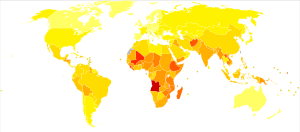Marasmus facts for kids
Marasmus is a serious type of malnutrition. It happens when someone, especially a child, doesn't get enough food. Our bodies need energy from food to live and grow. This energy comes from things like protein and fat. When a person has marasmus, they don't get enough food. This means they don't have the energy they need to stay healthy and survive.
Children with marasmus often look very skinny, or "emaciated." This is because their bodies have used up all their fat and muscles to try and get energy. A child with marasmus will weigh much less than a healthy child of the same age.
The word "marasmus" comes from the Greek word marasmos. It means "decay" or "wasting away."
Contents
What Marasmus Looks Like
Most children with marasmus look very thin and shrunken. They have lost most of their muscles and body fat. Their bodies try to save energy by slowing down important systems. This includes the immune system, which fights off sickness. It also affects how they grow. Less energy goes to organs like the liver, kidneys, heart, and digestive system.
Common Health Problems
When the body tries to save energy, it can cause other problems. These include:
- Too much fluid: The kidneys might not work well enough to remove extra fluid. This can cause swelling under the skin. It can even lead to heart failure.
- Low body temperature: Staying warm takes energy. Children with marasmus have almost no fat or muscles to keep them warm. This can lead to Hypothermia (very low body temperature).
- Low blood sugar: The child is not getting enough sugar or carbohydrates from food. This can cause Hypoglycemia (low blood sugar).
- Infections: The body's immune system is weak. This makes it harder to fight off infections.
Other Signs
Other signs of marasmus can include:
- Anemia: Not having enough red blood cells in the blood.
- Dehydration: Not having enough water in the body. This can cause shock.
- Fast breathing: This can happen from problems like pneumonia or heart failure.
- Eye problems
- Skin problems
- Ear, nose, and throat problems: Such as ear infections.
Why Marasmus Happens
Marasmus is caused by not getting enough of almost all nutrients. This is especially true for protein, carbohydrates, and lipids (fats). It means the body doesn't have the building blocks or energy it needs to function.
How Marasmus is Treated
Marasmus can be treated by giving emergency nutrients and fluids. However, just giving food is often not enough. The disease can cause other serious problems, called complications. These include infections, dehydration, and problems with the circulatory system. These complications are very dangerous. They often need to be treated quickly and correctly to save a child's life.
Related Health Topics
- Malnutrition
- Starvation
- Kwashiorkor (a similar disease caused by not having enough protein)
See also
 In Spanish: Marasmo para niños
In Spanish: Marasmo para niños
 | Emma Amos |
 | Edward Mitchell Bannister |
 | Larry D. Alexander |
 | Ernie Barnes |


